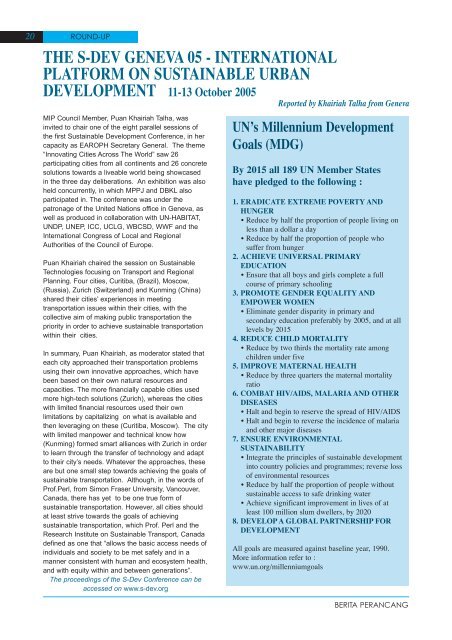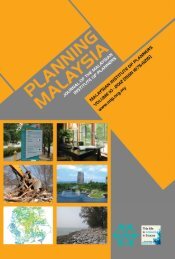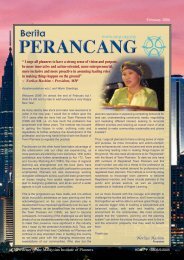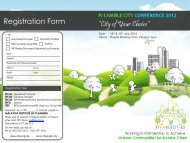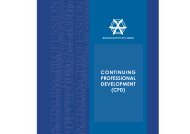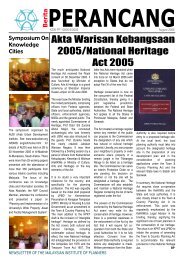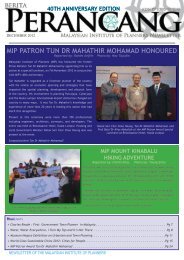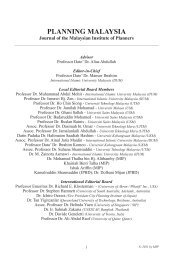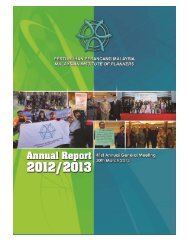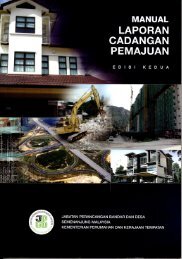Download November 2005 Issue - Malaysian Institute of Planners
Download November 2005 Issue - Malaysian Institute of Planners
Download November 2005 Issue - Malaysian Institute of Planners
Create successful ePaper yourself
Turn your PDF publications into a flip-book with our unique Google optimized e-Paper software.
20ROUND-UPTHE S-DEV GENEVA 05 - INTERNATIONALPLATFORM ON SUSTAINABLE URBANDEVELOPMENT 11-13 October <strong>2005</strong>Reported by Khairiah Talha from GenevaMIP Council Member, Puan Khairiah Talha, wasinvited to chair one <strong>of</strong> the eight parallel sessions <strong>of</strong>the first Sustainable Development Conference, in hercapacity as EAROPH Secretary General. The theme“Innovating Cities Across The World” saw 26participating cities from all continents and 26 concretesolutions towards a liveable world being showcasedin the three day deliberations. An exhibition was alsoheld concurrently, in which MPPJ and DBKL alsoparticipated in. The conference was under thepatronage <strong>of</strong> the United Nations <strong>of</strong>fice in Geneva, aswell as produced in collaboration with UN-HABITAT,UNDP, UNEP, ICC, UCLG, WBCSD, WWF and theInternational Congress <strong>of</strong> Local and RegionalAuthorities <strong>of</strong> the Council <strong>of</strong> Europe.Puan Khairiah chaired the session on SustainableTechnologies focusing on Transport and RegionalPlanning. Four cities, Curitiba, (Brazil), Moscow,(Russia), Zurich (Switzerland) and Kunming (China)shared their cities’ experiences in meetingtransportation issues within their cities, with thecollective aim <strong>of</strong> making public transportation thepriority in order to achieve sustainable transportationwithin their cities.In summary, Puan Khairiah, as moderator stated thateach city approached their transportation problemsusing their own innovative approaches, which havebeen based on their own natural resources andcapacities. The more financially capable cities usedmore high-tech solutions (Zurich), whereas the citieswith limited financial resources used their ownlimitations by capitalizing on what is available andthen leveraging on these (Curitiba, Moscow). The citywith limited manpower and technical know how(Kunming) formed smart alliances with Zurich in orderto learn through the transfer <strong>of</strong> technology and adaptto their city’s needs. Whatever the approaches, theseare but one small step towards achieving the goals <strong>of</strong>sustainable transportation. Although, in the words <strong>of</strong>Pr<strong>of</strong>.Perl, from Simon Fraser University, Vancouver,Canada, there has yet to be one true form <strong>of</strong>sustainable transportation. However, all cities shouldat least strive towards the goals <strong>of</strong> achievingsustainable transportation, which Pr<strong>of</strong>. Perl and theResearch <strong>Institute</strong> on Sustainable Transport, Canadadefined as one that “allows the basic access needs <strong>of</strong>individuals and society to be met safely and in amanner consistent with human and ecosystem health,and with equity within and between generations”.The proceedings <strong>of</strong> the S-Dev Conference can beaccessed on www.s-dev.orgUN’s Millennium DevelopmentGoals (MDG)By 2015 all 189 UN Member Stateshave pledged to the following :1. ERADICATE EXTREME POVERTY ANDHUNGER• Reduce by half the proportion <strong>of</strong> people living onless than a dollar a day• Reduce by half the proportion <strong>of</strong> people whosuffer from hunger2. ACHIEVE UNIVERSAL PRIMARYEDUCATION• Ensure that all boys and girls complete a fullcourse <strong>of</strong> primary schooling3. PROMOTE GENDER EQUALITY ANDEMPOWER WOMEN• Eliminate gender disparity in primary andsecondary education preferably by <strong>2005</strong>, and at alllevels by 20154. REDUCE CHILD MORTALITY• Reduce by two thirds the mortality rate amongchildren under five5. IMPROVE MATERNAL HEALTH• Reduce by three quarters the maternal mortalityratio6. COMBAT HIV/AIDS, MALARIA AND OTHERDISEASES• Halt and begin to reserve the spread <strong>of</strong> HIV/AIDS• Halt and begin to reverse the incidence <strong>of</strong> malariaand other major diseases7. ENSURE ENVIRONMENTALSUSTAINABILITY• Integrate the principles <strong>of</strong> sustainable developmentinto country policies and programmes; reverse loss<strong>of</strong> environmental resources• Reduce by half the proportion <strong>of</strong> people withoutsustainable access to safe drinking water• Achieve significant improvement in lives <strong>of</strong> atleast 100 million slum dwellers, by 20208. DEVELOP A GLOBAL PARTNERSHIP FORDEVELOPMENTAll goals are measured against baseline year, 1990.More information refer to :www.un.org/millenniumgoalsBERITA PERANCANG


